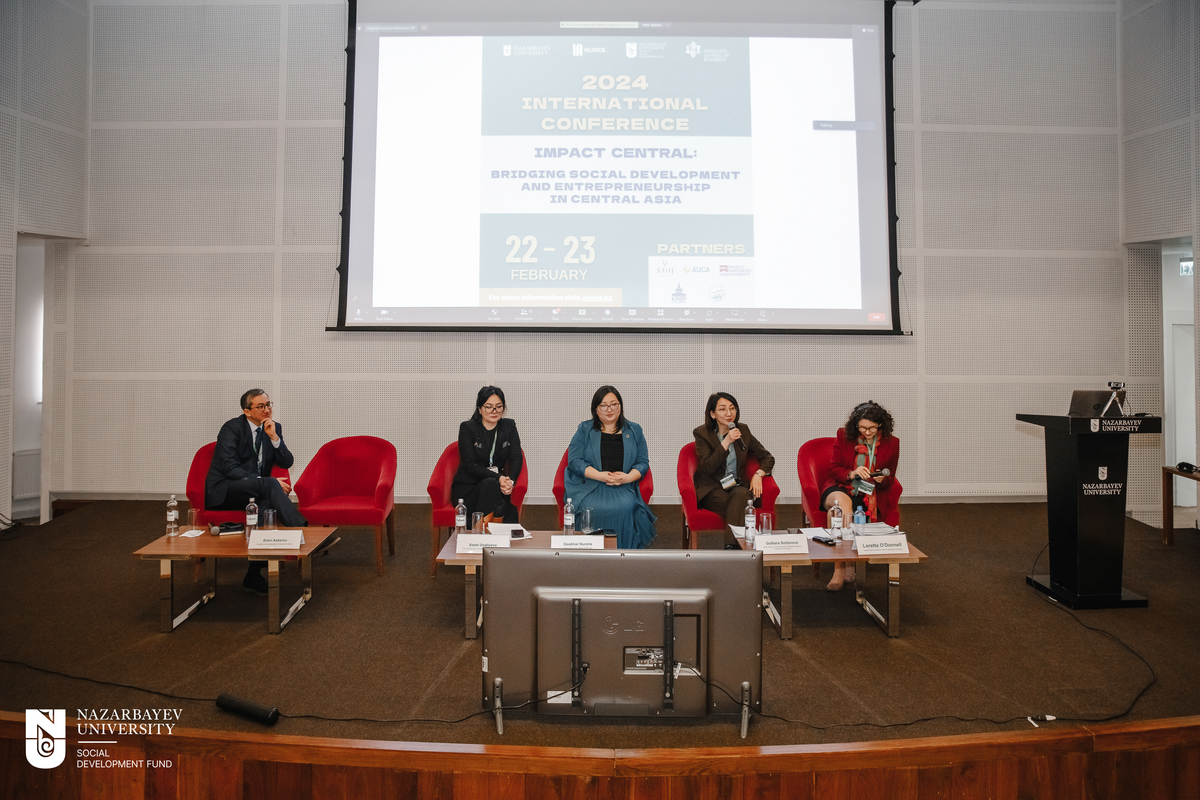ASTANA – Nazarbayev University (NU) in Astana hosted on Feb. 22 an international conference that gathered researchers and practitioners in social entrepreneurship to discuss how social enterprises can work with universities and the government to combat social problems.

From left to right: President of the Association of Social Innovators Emin Askerov, NU Vice President for Innovation Assel Uvaliyeva, UNDP Kazakhstan Gender Specialist Gaukhar Nursha, Chairwoman of the Civil Society Affairs Committee of the Kazakh Ministry of Culture and Information Gulbara Sultanova, NU Vice-Provost for Academic Affairs O’Donnell Loretta. Photo Credit: NU SDF press service.
The two-day conference, organized by the NU Social Development Fund (SDF) and the NU Entrepreneurship Research Center (NURCE), served as a platform to build effective collaboration and integrate knowledge among institutions involved in creating sustainable change.
Kazakh Minister of Science and Higher Education Saysat Nurbek highlighted the importance of the “third mission” of universities in promoting social change and making a difference for local communities.
“They should not serve the elite; they should serve the society. They should bring community outreach and service not just as part of their responsibility but as part of their agenda and strategy. We’re now trying to push all universities to have more civic engagement, community outreach, community service, and service learning,” said Nurbek.
With the power of universities, which lies in their unique approaches to education, the minister outlined initiatives that are consistently working to help people transform their lives.
“Just to give you several examples: two years ago, one of our regional universities in Kokshetau launched a ‘silver university’ model. They provided senior members of the local community, retired or pre-retirement age, with a continuous education of short-term courses, such as web design and English language. They also launched a program for tourist guides. You know, the Kokshetau and Burabai regions are touristic destinations. So now they have a program to train senior citizens as tour guides, given their experience, the knowledge of the local terrain and history of that region,” said Nurbek.
The program became a prime example of how one socially oriented initiative could scale and bring dynamic and life-changing solutions to more people.
“Those programs became very popular and now are being replicated by 72 universities throughout Kazakhstan. They started giving these public courses at silver university for local senior members of the community,” added Nurbek.
The benefits of this approach have been significant.
“The first reports coming in from the silver university model are quite interesting. The quality of education and academic performance in families where the senior citizens were involved in silver university courses has, actually, increased because these granddads and grandmothers now can be more assertive in teaching their grandkids,” said Nurbek.
Director of the NURCE research center, Professor Shumaila Yousafzai, spoke of the significant contribution of women in Central Asian countries to the advancement of social entrepreneurship. She shared insights from the monograph titled “Together We Have It All: Women Entrepreneurs in the Tourism Sector, A Case Study of the Kyrgyzstan Community,” providing a comprehensive examination of the experiences of female entrepreneurs driving community tourism in Kyrgyzstan.
She also introduced the book “Innovators of Steppe Spaces: Inspiring Stories of Kazakhstani Businesswomen,” which features profiles of 50 remarkable Kazakh female entrepreneurs.
“These stories of empowerment, challenges and success serve not only to inspire but also to create a more inclusive economic ecosystem in Central Asia,” said Yousafzai.
“The region, with its rich cultural heritage and dynamic socio-economic landscape, is full of potential that remains largely untapped. Entrepreneurs sometimes face challenges in accessing markets and capitalizing on technological opportunities. Yet hidden among these challenges are huge opportunities for growth, innovation and impact. That is why we bring everyone together at these conferences,” she continued.
According to the President of the Association of Social Innovators Emin Askerov, social entrepreneurship in Kazakhstan “has a female face,” with women leading the majority of social initiatives and projects.
“According to the latest official data there are 274 social entrepreneurs [in Kazakhstan], according to unofficial statistics – around 15,000. 55% are involved in addressing employment issues of the socially vulnerable category, the rest in the field of inclusive education, medicine and ecology,” said Askerov.
“Our main supervisor is the Ministry of National Economy and now we are working on various preferences so that social entrepreneurship can be further developed,” he added.

